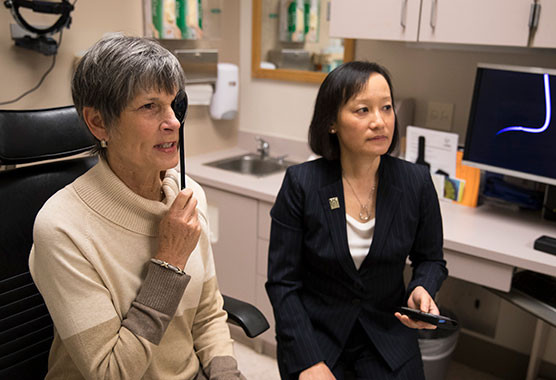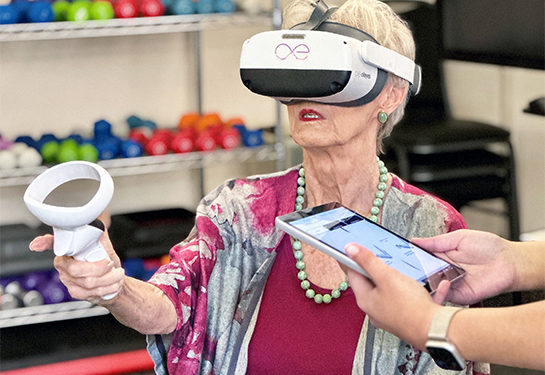Cataracts and Lens Disorders
UC Davis Health Eye Center specialists know your vision is vital to your quality of life. We use the latest surgical techniques for cataracts and other lens disorders.
Medically reviewed by Jeffrey Ma, M.D. on Aug. 31, 2023.

Types of Lens Diseases
The lenses in your eyes play a role in focusing what you see into sharp images. A problem with your lens can cause blurry vision, cloudy vision, or blindness.
Types of lens disorders include:
- Aphasia Aphakia: Missing lens.
- Cataract: Cloudy lens, the most common lens disorder.
- Ectopia lentis: Slipped lens.
- Microspherophakia: Abnormally small lens.
At the UC Davis Health Eye Center, we use leading-edge technology for eye exams, diagnosis, and treatment. We specialize in cataract removal and lens implants.
Symptoms of Cataracts and Lens Disorders
Symptoms of cataracts and lens disorders usually include a change in how you see.
Common Symptoms
You may experience:
- Blurry or cloudy vision
- Changes in your vision prescription
- Double vision
- Glare and starbursts around lights
- Light sensitivity
- Poor night vision
- Trouble reading in dim lighting
Emergency Symptoms
Get medical care right away if you have:
- Severe eye pain
- Sudden change in vision
Causes of Cataracts
Different lens disorders have different causes. Certain factors raise your risk for developing lens disorders. Some of these factors are in your control, but others are not.
Cataracts are by far the most common lens condition we treat.
Injury
Trauma or injury to your eye can cause cataracts, aphakia or ectopia lentis.
Sun Exposure
Over time, ultraviolet (UV) light can damage proteins in your lens and lead to cataracts.
Surgery
Prior eye surgery can increase your risk of developing cataracts.
Risk Factors for Lens Disorders
There are certain things that can increase your risk for lens disorders, including:
Age
The risk of cataracts increases as you get older.
High Blood Sugar
Having diabetes or high blood sugar raises your risk of cataracts.
Medications
Medications such as steroids can increase the risk of cataracts.
Diagnosing Cataracts and Lens Disorders
Your eye care team will perform a comprehensive eye exam to check your vision and different parts of your eyes.
Our comprehensive eye exams are extremely thorough and include the most advanced technology available.
Tests to check specifically for cataracts and lens disorders include:
- Slit lamp exam: Your eye care specialist uses a special microscope with a light to examine your eyes' inner and outer structures.
- Vision test: Your specialist asks you to read an eye chart with letters of different sizes. This helps show if you need glasses or an update to your prescription.
Learn about our optometry department and meet our team of eye care specialists.
Treatments for Cataracts and Lens Disorders at UC Davis Health
Our eye specialists and vision researchers work together to provide you with leading-edge eye care.
Surgery
Our ophthalmologists treat cataracts and lens disorders by replacing a cloudy, damaged or missing lens. We use advanced techniques such as no-injection, no-stitch cataract surgery and laser-assisted cataract surgery. We can combine cataract surgery with vision correction surgery.
One unique aspect of the UC Davis Health Eye Center is that we manage complex cataract surgery. These are cases in which the cataract has features that make it a more high-risk surgery, such as a mature cataract or a subluxated cataract. We also treat patients who have problems from prior cataract surgery, such as a dislocated (loose) intraocular lens implant. Also, many patients have coexisting ocular conditions that require other procedures done at the same time. We have specialists who perform cataract surgery combined with other surgeries to address glaucoma, corneal diseases and retinal diseases.
Learn more about comprehensive ophthalmology and cataract surgery
By 2050, an estimated
50MPeople will have a cataract diagnosis
Source: National Institutes of Health National Eye Institute Media Library: Infographics: Cataract: NEI Looks Ahead
Request an Appointment
As Sacramento's No. 1 hospital, you'll benefit from unique advantages in primary care and specialty care. This includes prevention, diagnosis and treatment options from experts in 150 specialties.
Referring Physicians
To refer a patient, submit an electronic referral form or call.
800-4-UCDAVIS
Patients
Call to make an appointment.
Consumer Resource Center
800-2-UCDAVIS

Ranked among the nation’s best hospitals
A U.S. News & World Report best hospital in cardiology, heart & vascular surgery, diabetes & endocrinology, ENT, geriatrics, neurology & neurosurgery, and pulmonology & lung surgery.

Ranked among the nation’s best children’s hospitals
U.S. News & World Report ranked UC Davis Children’s Hospital among the best in pediatric nephrology, orthopedics*, and pulmonology & lung surgery. (*Together with Shriners Children’s Northern California)

Ranked Sacramento’s #1 hospital
Ranked Sacramento’s #1 hospital by U.S. News, and high-performing in aortic valve surgery, back surgery (spinal fusion), COPD, colon cancer surgery, diabetes, gynecological cancer surgery, heart arrhythmia, heart failure, kidney failure, leukemia, lymphoma & myeloma, lung cancer surgery, pacemaker implantation, pneumonia, prostate cancer surgery, stroke, TAVR, cancer, orthopedics, gastroenterology & GI surgery, and urology.

The nation’s highest nursing honor
UC Davis Medical Center has received Magnet® recognition, the nation’s highest honor for nursing excellence.

World-class cancer care
One of ~59 U.S. cancer centers designated “comprehensive” by the National Cancer Institute.

A leader in health care equality
For the 13th consecutive year, UC Davis Medical Center has been recognized as an LGBTQ+ Healthcare Equality Leader by the educational arm of America’s largest civil rights organization.

